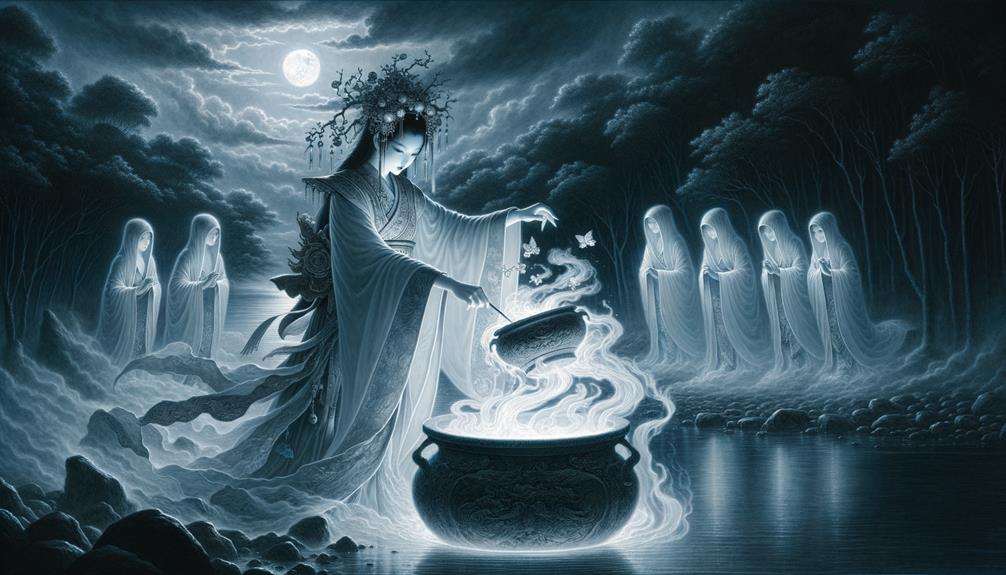As Meng Po, the mythical gatekeeper of reincarnation, I oversee souls transitioning to their next life. My Five Flavored Tea of Forgetfulness, concocted from mystical flora and spiritual remnants, purifies one's essence for rebirth. Imbibing this elixir dissolves the imprints of joys and sorrows, allowing the cycle to flow unhindered. Upon drinking, one sheds their former identity, emerging renewed. Together, we'll explore the profound rituals and transformative nature of reincarnation.
Origin of Meng Po
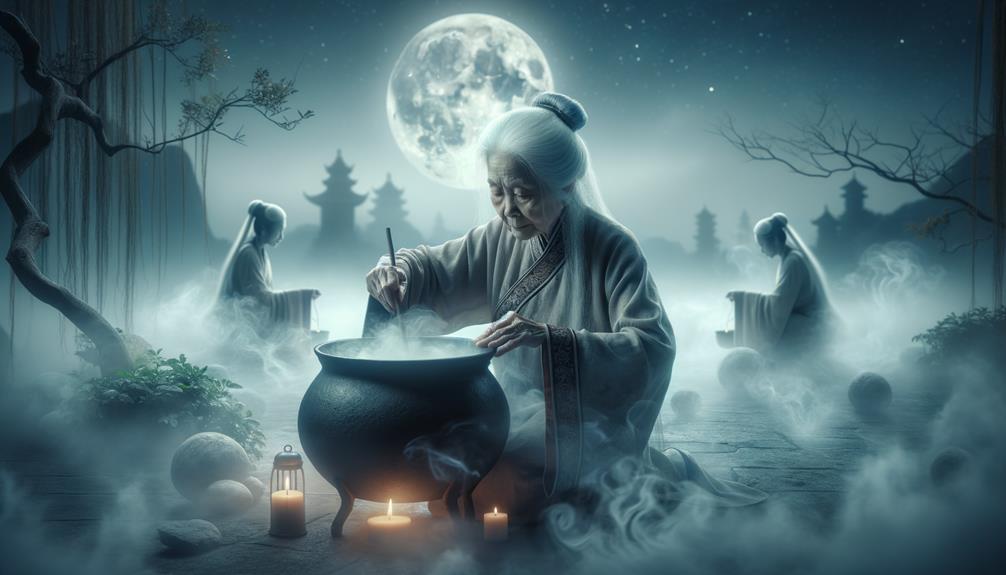
In Chinese mythology, Lady Meng Jiang transforms into Meng Po, a pivotal figure associated with the cycle of reincarnation. Overwhelmed by profound loss, Lady Meng Jiang concocted the Five Flavored Tea, a mystical brew enabling souls to forget their past lives' pain before embarking on their next journey.
Her creation, also known as Meng Po Soup, served a vital function – helping souls relinquish memories that could impede progress. Myths suggest newborns who unexpectedly speak may have skipped the tea, retaining echoes from previous existences. Lady Meng Jiang's metamorphosis into Meng Po underscores her crucial role in aiding souls through the reincarnation process, offering a merciful respite from lingering anguish.
The Elixir of Forgetfulness
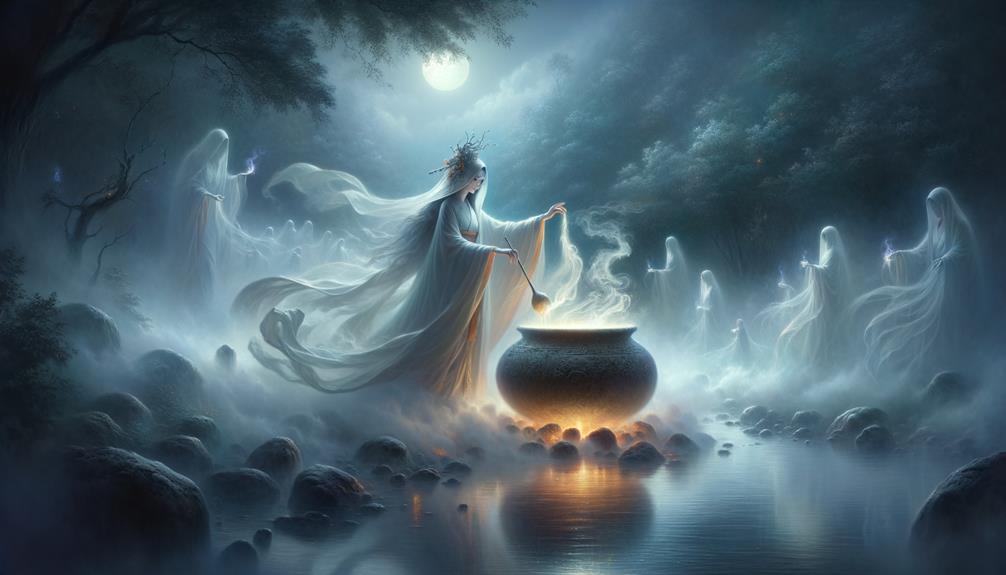
Meng Po's Five Flavored Soup erases memories with a single sip, ensuring souls embark on their reincarnation journey unburdened. As they stand on the Bridge of Forgetfulness, these souls reach a pivotal moment in their passage through Diyu, the Chinese realm of the dead. The elixir, crafted from potent herbs and the tears of the damned, blends compassion and necessity, enabling the cycle of reincarnation to proceed untainted.
In Chinese mythology, Meng Po plays an indispensable role. Her Five Flavored Soup ushers souls into oblivion, stripping away memories of previous earthly experiences. This act of forgetfulness purifies souls, allowing them to face new existences with a blank slate. Without this intervention, the weight of past joys and sorrows would tether souls, impeding their karmic journeys.
Standing at reincarnation's threshold, the souls, once they sip the elixir, shed their former identities. Through Meng Po's ministrations, they cross the Bridge of Forgetfulness, stepping into new lives, unshackled and ready for a fresh start.
Role in Reincarnation
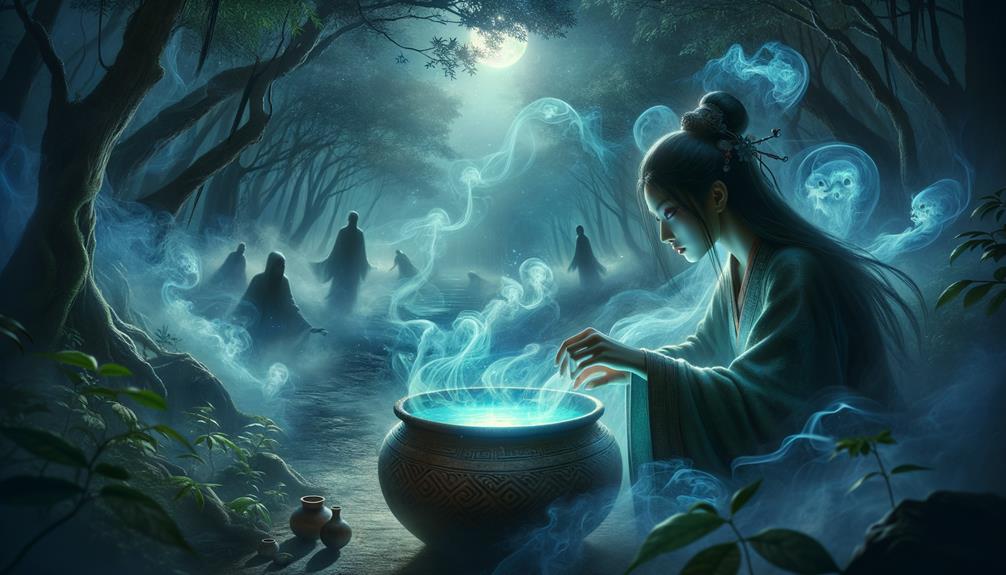
Meng Po's pivotal role shapes the cycle of reincarnation for souls profoundly. As guardian of the Bridge of Oblivion, she stands at a crucial point in a soul's epic journey. Her Five Flavored Tea of Forgetfulness cleanses memories, allowing souls to begin anew, unencumbered by their past.
Each soul arriving in Diyu, the realm of the deceased, carries karmic baggage from previous lives. Meng Po's brew induces instant, permanent amnesia, erasing lingering imprints. More than mere forgetfulness, it ritually resets the soul's journey, providing a blank canvas for destiny.
Without this step, souls would remain trapped in past torments, unable to fully engage the cycle. Occasionally, some evade Meng Po's tea, leading newborns to speak of past lives – fleeting glimpses into existence's continuity. Meng Po's role ensures the celestial cycle of birth and rebirth flows unbroken.
Rituals and Beliefs
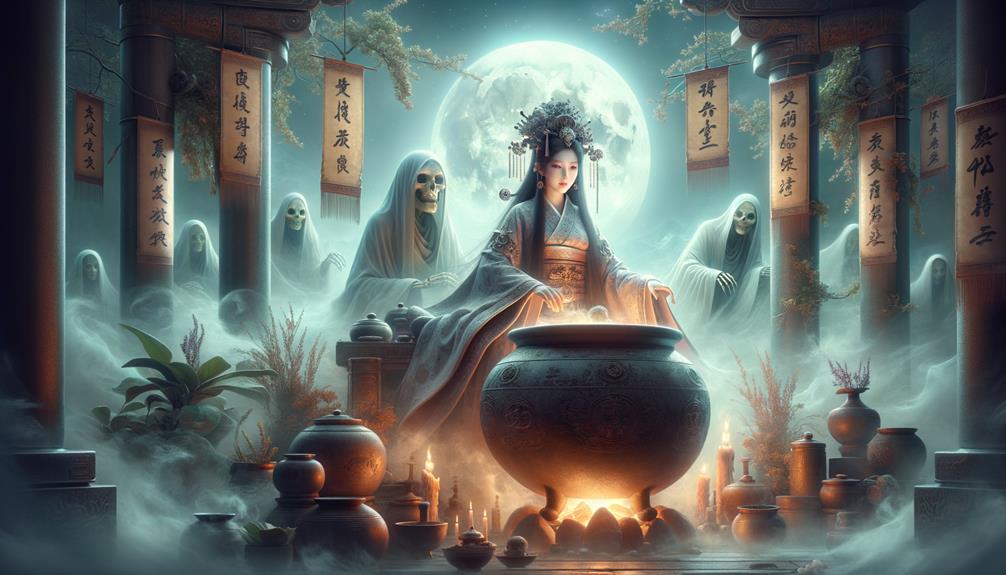
Souls arrive at the Bridge of Oblivion, partaking in the ritual of consuming Meng Po's Soup of Forgetfulness – a symbolic rebirth free from baggage. In Chinese mythology, Meng Po oversees this transformative brew that washes away memories.
This sacred drink signifies profound change, allowing souls to start fresh without burdens of past joy or suffering. Drinking it is cleansing, releasing souls from cycles that once defined them. Each sip provides a blank slate for reincarnation.
The ritual mirrors the archetypal hero's journey. It represents crossing a threshold, leaving the known for uncharted territory. By shedding memories, souls undergo metamorphosis, honoring the perpetual cycles of death and rebirth core to Chinese mythology.
Meng Po in Modern Culture
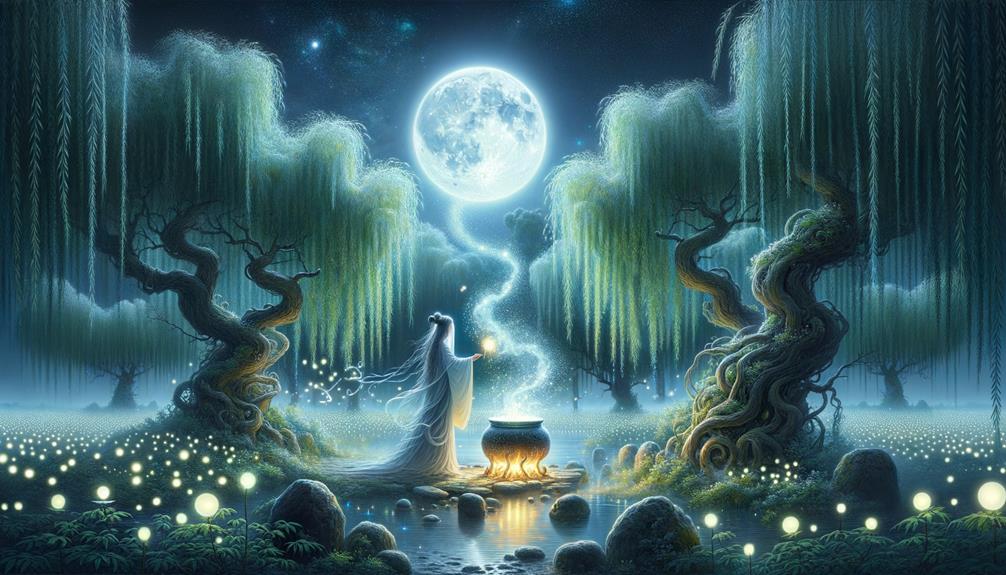
Nowadays, Meng Po's forgetfulness potion resurfaces in our stories, from portraying her in "The Ferry Man Manjusaka" to her ethereal presence on Pluto. She weaves through video games like "Dislyte" and paints herself into contemporary art, symbolizing the constant pursuit to shed past burdens. Even in humor, we joke about tricking her, proving Meng Po's enduring role in our shared narratives.
Popular Media References
Meng Po's mystique intertwines seamlessly with contemporary life, an ancient thread woven into a modern tapestry. Known as the Goddess of Forgetfulness in Chinese lore, she stands at Naihe Bridge in the underworld, offering souls a flavored broth that wipes away past life memories as they cross over, liberating them from their burdens.
Popular media breathes new life into her mythological essence. The 2018 film 'The Ferry Man Manjusaka' reimagined Meng Po's character, blending ancient myth with modern storytelling. Her influence extends even to the cosmos, with a dark region on Pluto bearing her name – a nod to her enduring legacy.
In the gaming realm, 'Dislyte' features abilities mirroring Meng Po's memory-erasing brew, captivating players with the promise of forgotten pasts. Online, netizens playfully jest about tricking the goddess with her own concoction, highlighting her imprint on humor and memes.
Meng Po's tale continues inspiring, reminding us of universal themes – memory, oblivion, and the soul's eternal journey. Her presence in modern culture underscores the timeless allure of mythology.
Symbolism in Art
Countless contemporary artists depict Meng Po as the compassionate guide who offers souls a new beginning with her Five Flavored Soup of Forgetfulness. In these visuals, Old Lady Meng stands at the Naihe Bridge, a serene figure draped in simple earthen robes. Her long, grey hair, adorned with jade-green flowers, symbolizes rejuvenation and fresh starts, solidifying her role as a mythological gatekeeper between lives.
Artistic interpretations often capture her duality – both a stern guardian and a nurturing presence. The underworld landscape of Diyu serves as a backdrop, emphasizing her connection to the afterlife and the cyclical nature of reincarnation.
| Visual Element | Symbolism | Theme |
|---|---|---|
| Jade-green Flowers | Rebirth, Renewal | Reincarnation |
| Earth-toned Robes | Simplicity, Humility | Connection to Afterlife |
| Naihe Bridge | Passage between Existences | Transformation |
| Five Flavored Soup | Oblivion, Forgetting | Clean Slate |
| Grey Hair | Wisdom, Age | Timeless Guidance |
These elements collectively illustrate Meng Po's mythological role as the bridge between past and future, gracefully guiding souls toward new existences. Through art, we gain a deeper appreciation of her symbolic significance in the eternal cycle of life and death.
Contemporary Adaptations
Contemporary popular culture continues exploring Meng Po's mythological essence as the goddess of oblivion. Her cinematic debut in 2018's 'The Ferry Man Manjusaka' visualized her ancient role. Beyond film, an area on Pluto bears her name, signifying her cosmic resonance.
Meng Po's legend integrates gaming realms like 'Dislyte,' where a character personifies her oblivion elixir. Online discourse playfully reimagines outwitting Meng Po with her memory-erasing soup, revealing her lasting allure.
These modern retellings underscore Meng Po's timeless themes still inspiring today's cultural narratives. Her mythology resonates across mediums, enduring as a potent archetype.
Symbolism and Interpretations
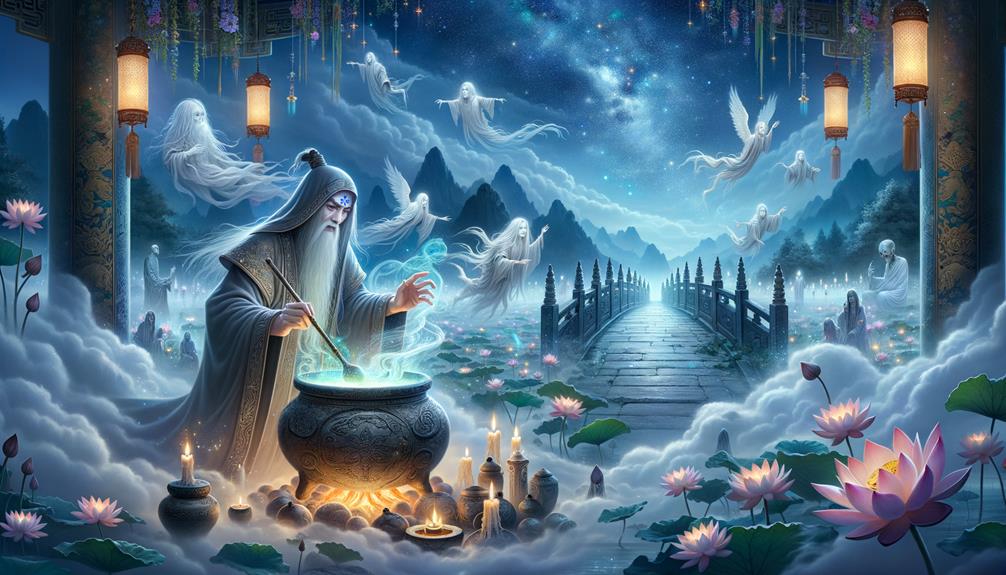
When reflecting on Meng Po's elixir, I see the River of Oblivion as a pivotal stage in life's journey, representing the letting go that precedes rebirth. By drinking her concoction, souls shed past burdens, ready for a new cycle. This act transcends mere erasure; it's a profound metamorphosis allowing each soul to begin anew, mirroring the timeless rhythm of life, death, and rebirth.
River of Oblivion
The River of Oblivion, a mystical river in Chinese mythology, marks the boundary where souls shed their earthly memories before entering the afterlife. It holds deep symbolic significance. At this river, Meng Po, the goddess of forgetfulness, brews her renowned Five Flavored Soup. Drinking this brew ensures souls cross into the underworld, Diyu, unencumbered by past experiences.
- It signifies the divide between life and death.
- It represents cleansing memories and life experiences.
- It marks the transition to the afterlife.
Within this mythological framework, the River of Oblivion mirrors the archetypal hero's journey. Souls face the ultimate challenge – letting go of earthly attachments. By drinking Meng Po's Five Flavored Soup, they embrace forgetfulness, preparing for reincarnation unburdened by former lives. This act symbolizes rebirth, a clean slate for new stories. It poignantly reminds us of life's cyclical nature, emphasizing the necessity of moving forward. In Chinese myth, this river doesn't merely cleanse; it transforms, allowing souls to transcend their past and embark on new journeys.
Cycle of Rebirth
The cycle of rebirth interweaves Chinese folklore, painting a portrait where souls cleanse through Meng Po's elixir before emerging anew, their destinies shaped by previous actions. This continuous reincarnation reflects karma's invisible tether, guiding souls' journeys as deeds from prior lives determine future manifestations. Without Meng Po's memory-erasing draught, newborns might recall their pasts, disrupting reincarnation's delicate equilibrium.
At its core, Chinese mythology's rebirth cycle echoes universal narratives of growth and enlightenment. Reincarnation, coupled with the forgetfulness elixir's cleansing, offers souls boundless chances to evolve, absorb wisdom, and strive towards transcendence. This archetypal theme mirrors humanity's timeless quest for progression.
Frequently Asked Questions
What Is the Soup of Forgetfulness?
The soup of forgetfulness? Yeah, I drank that stuff when crossing the Bridge of Oblivion. Wiped my slate clean – no more baggage or heartache weighing me down. It was like getting a fresh start, ready to begin anew.
What Are the 18 Hells of Buddhism?
In Buddhism, the 18 Hells depict realms of suffering inflicted on those who perpetrated immoral acts during their lives. These terrifying depictions serve as cautionary tales, urging devotees to live virtuously and attain spiritual enlightenment. The vivid descriptions of torment remind us that our deeds bear karmic consequences, motivating righteous conduct.
Is Mogwai a Chinese Word?
The 1984 film 'Gremlins' invented the word 'mogwai,' a fictional blend of folklore and contemporary imagination. These dual-natured creatures perfectly captured that era's cultural zeitgeist, merging old tales with modern pop fantasy. While not an actual Chinese term, 'mogwai' has taken on iconic status, demonstrating the power of creative storytelling in shaping cultural lexicons.
What Is the Story of Lady Meng Jiang?
Imagine a woman whose devotion shook the foundations of the Great Wall. Lady Meng Jiang's tears cracked the stone barrier, revealing her husband's remains. Her tale of unwavering loyalty and sacrifice echoes through history, a poignant reminder of love's unbreakable bond.

